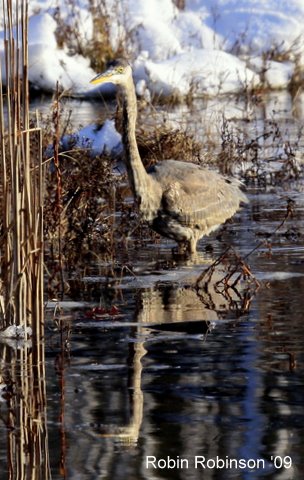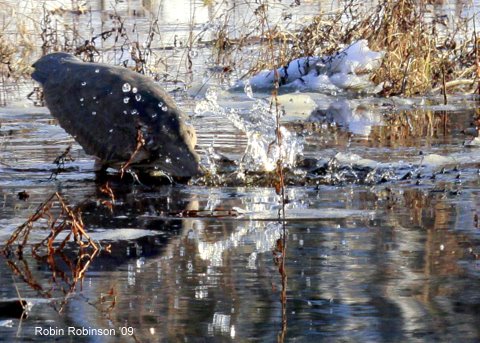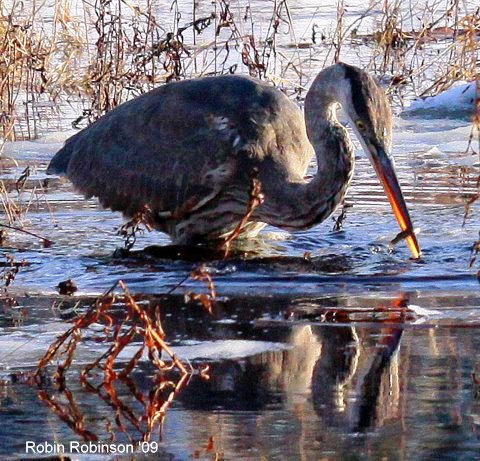December 28, 2009 at 11:20 am
[caption id="attachment_102" align="alignleft" width="95" caption="Great blue heron wading in Maine's icy waters."] [/caption]
Colonial wading birds tend to conjure up an image of the lush and wet Everglades rather than our frozen Maine landscape, yet some of these birds continue to linger in Maine through December. Two great blue herons were seen on Saturday, Dec 19th in a Kittery backyard. Four great blue herons were spotted flying over York Harbor on December 10th; 1 was seen in Brunswick on December 7th, and 1 was seen fishing at a pond in Phippsburg on December 6th. Great blue herons are often detected on Christmas Bird Counts in Maine, especially in mild or late winters.
There have been as many as 50 individual great blue herons reported in one year by CBC counters during the Dec 14th - Jan 5th count window. It is extremely rare to see other colonial wading birds in Maine in winter.
[caption id="attachment_119" align="alignleft" width="150" caption="Great blue heron plunges its head into the water after a fish..."]
[/caption]
Colonial wading birds tend to conjure up an image of the lush and wet Everglades rather than our frozen Maine landscape, yet some of these birds continue to linger in Maine through December. Two great blue herons were seen on Saturday, Dec 19th in a Kittery backyard. Four great blue herons were spotted flying over York Harbor on December 10th; 1 was seen in Brunswick on December 7th, and 1 was seen fishing at a pond in Phippsburg on December 6th. Great blue herons are often detected on Christmas Bird Counts in Maine, especially in mild or late winters.
There have been as many as 50 individual great blue herons reported in one year by CBC counters during the Dec 14th - Jan 5th count window. It is extremely rare to see other colonial wading birds in Maine in winter.
[caption id="attachment_119" align="alignleft" width="150" caption="Great blue heron plunges its head into the water after a fish..."] [/caption]
It is the variable diet of the great blue heron that enables this species to winter (or linger into the winter) farther north than most other herons and wading birds. Besides fish, they will also pursue amphibians, reptiles, invertebrates, small mammals, and even other birds as prey. While inland waters may freeze early, coastal waters usually remain ice-free longer and thus attract herons and other fish-eaters. In winters when cold temperatures come early without snowfall, great blue herons will exploit upland rodent populations in snow-free fields since their aquatic pantry may be iced over and inaccessible.
The key factor determining how long into winter they remain in Maine is food. Once food becomes too difficult and costly to obtain, there’s good reason to continue moving south towards warmer, ice-free areas.
As with most migratory species in New England, the great blue heron tends to follow a major geographic migratory route known as the Atlantic Flyway.
[caption id="attachment_116" align="alignleft" width="150" caption="...and comes up successful!"]
[/caption]
It is the variable diet of the great blue heron that enables this species to winter (or linger into the winter) farther north than most other herons and wading birds. Besides fish, they will also pursue amphibians, reptiles, invertebrates, small mammals, and even other birds as prey. While inland waters may freeze early, coastal waters usually remain ice-free longer and thus attract herons and other fish-eaters. In winters when cold temperatures come early without snowfall, great blue herons will exploit upland rodent populations in snow-free fields since their aquatic pantry may be iced over and inaccessible.
The key factor determining how long into winter they remain in Maine is food. Once food becomes too difficult and costly to obtain, there’s good reason to continue moving south towards warmer, ice-free areas.
As with most migratory species in New England, the great blue heron tends to follow a major geographic migratory route known as the Atlantic Flyway.
[caption id="attachment_116" align="alignleft" width="150" caption="...and comes up successful!"] [/caption]
We don’t know exactly where “our” great blue herons winter, but they most likely winter along ice-free rivers and coastal areas along the Atlantic seaboard. The few banding studies that have been conducted suggest many winter further south in the Caribbean. Two great blue herons banded on Otter Island in Muscongus Bay, Maine in 1939 and 1940 were recovered in the winter in Cuba!
Since December 19th I haven’t heard any more reports of great blue herons in Maine, so I’m guessing they’ve all left the state in search of food-rich areas that don’t require the use of their spear-like beaks to break through the ice. They leave the ice-fishing to us humans!
[/caption]
We don’t know exactly where “our” great blue herons winter, but they most likely winter along ice-free rivers and coastal areas along the Atlantic seaboard. The few banding studies that have been conducted suggest many winter further south in the Caribbean. Two great blue herons banded on Otter Island in Muscongus Bay, Maine in 1939 and 1940 were recovered in the winter in Cuba!
Since December 19th I haven’t heard any more reports of great blue herons in Maine, so I’m guessing they’ve all left the state in search of food-rich areas that don’t require the use of their spear-like beaks to break through the ice. They leave the ice-fishing to us humans!
 [/caption]
Colonial wading birds tend to conjure up an image of the lush and wet Everglades rather than our frozen Maine landscape, yet some of these birds continue to linger in Maine through December. Two great blue herons were seen on Saturday, Dec 19th in a Kittery backyard. Four great blue herons were spotted flying over York Harbor on December 10th; 1 was seen in Brunswick on December 7th, and 1 was seen fishing at a pond in Phippsburg on December 6th. Great blue herons are often detected on Christmas Bird Counts in Maine, especially in mild or late winters.
There have been as many as 50 individual great blue herons reported in one year by CBC counters during the Dec 14th - Jan 5th count window. It is extremely rare to see other colonial wading birds in Maine in winter.
[caption id="attachment_119" align="alignleft" width="150" caption="Great blue heron plunges its head into the water after a fish..."]
[/caption]
Colonial wading birds tend to conjure up an image of the lush and wet Everglades rather than our frozen Maine landscape, yet some of these birds continue to linger in Maine through December. Two great blue herons were seen on Saturday, Dec 19th in a Kittery backyard. Four great blue herons were spotted flying over York Harbor on December 10th; 1 was seen in Brunswick on December 7th, and 1 was seen fishing at a pond in Phippsburg on December 6th. Great blue herons are often detected on Christmas Bird Counts in Maine, especially in mild or late winters.
There have been as many as 50 individual great blue herons reported in one year by CBC counters during the Dec 14th - Jan 5th count window. It is extremely rare to see other colonial wading birds in Maine in winter.
[caption id="attachment_119" align="alignleft" width="150" caption="Great blue heron plunges its head into the water after a fish..."] [/caption]
It is the variable diet of the great blue heron that enables this species to winter (or linger into the winter) farther north than most other herons and wading birds. Besides fish, they will also pursue amphibians, reptiles, invertebrates, small mammals, and even other birds as prey. While inland waters may freeze early, coastal waters usually remain ice-free longer and thus attract herons and other fish-eaters. In winters when cold temperatures come early without snowfall, great blue herons will exploit upland rodent populations in snow-free fields since their aquatic pantry may be iced over and inaccessible.
The key factor determining how long into winter they remain in Maine is food. Once food becomes too difficult and costly to obtain, there’s good reason to continue moving south towards warmer, ice-free areas.
As with most migratory species in New England, the great blue heron tends to follow a major geographic migratory route known as the Atlantic Flyway.
[caption id="attachment_116" align="alignleft" width="150" caption="...and comes up successful!"]
[/caption]
It is the variable diet of the great blue heron that enables this species to winter (or linger into the winter) farther north than most other herons and wading birds. Besides fish, they will also pursue amphibians, reptiles, invertebrates, small mammals, and even other birds as prey. While inland waters may freeze early, coastal waters usually remain ice-free longer and thus attract herons and other fish-eaters. In winters when cold temperatures come early without snowfall, great blue herons will exploit upland rodent populations in snow-free fields since their aquatic pantry may be iced over and inaccessible.
The key factor determining how long into winter they remain in Maine is food. Once food becomes too difficult and costly to obtain, there’s good reason to continue moving south towards warmer, ice-free areas.
As with most migratory species in New England, the great blue heron tends to follow a major geographic migratory route known as the Atlantic Flyway.
[caption id="attachment_116" align="alignleft" width="150" caption="...and comes up successful!"] [/caption]
We don’t know exactly where “our” great blue herons winter, but they most likely winter along ice-free rivers and coastal areas along the Atlantic seaboard. The few banding studies that have been conducted suggest many winter further south in the Caribbean. Two great blue herons banded on Otter Island in Muscongus Bay, Maine in 1939 and 1940 were recovered in the winter in Cuba!
Since December 19th I haven’t heard any more reports of great blue herons in Maine, so I’m guessing they’ve all left the state in search of food-rich areas that don’t require the use of their spear-like beaks to break through the ice. They leave the ice-fishing to us humans!
[/caption]
We don’t know exactly where “our” great blue herons winter, but they most likely winter along ice-free rivers and coastal areas along the Atlantic seaboard. The few banding studies that have been conducted suggest many winter further south in the Caribbean. Two great blue herons banded on Otter Island in Muscongus Bay, Maine in 1939 and 1940 were recovered in the winter in Cuba!
Since December 19th I haven’t heard any more reports of great blue herons in Maine, so I’m guessing they’ve all left the state in search of food-rich areas that don’t require the use of their spear-like beaks to break through the ice. They leave the ice-fishing to us humans!Categories